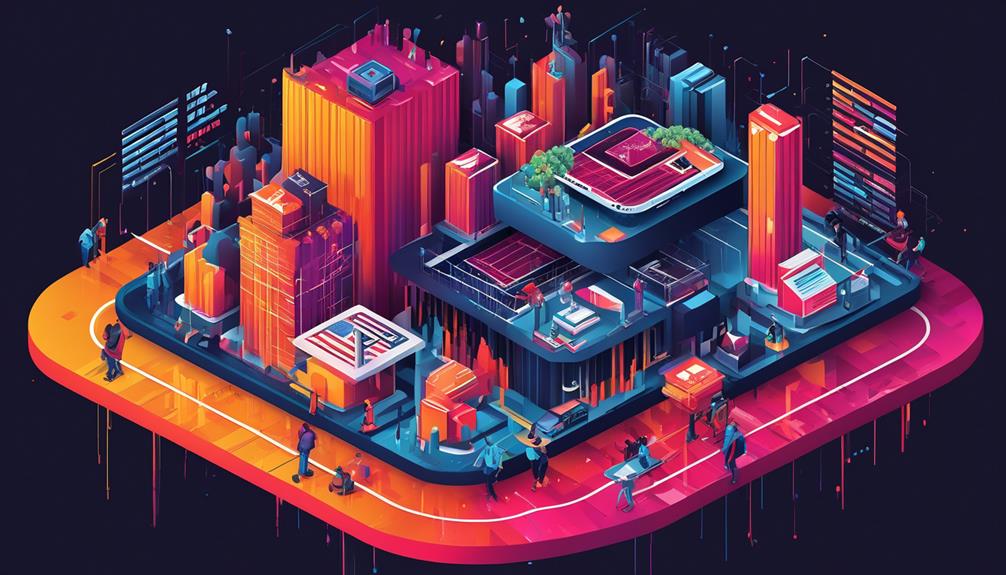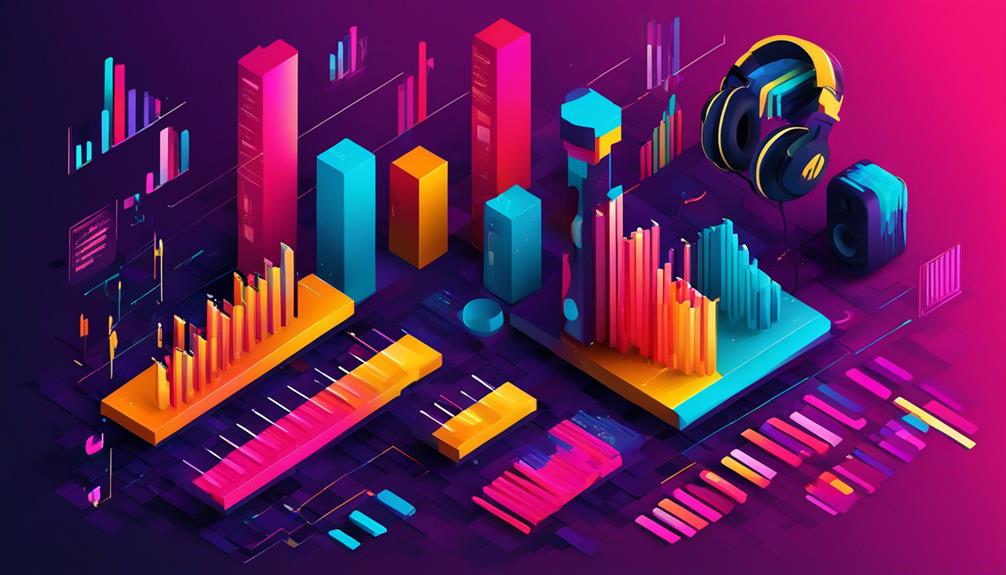As I delved into the world of rap statistics, I was surprised to uncover some truly eye-opening insights.
Did you know that rap and hip-hop music account for a staggering 26% of global music consumption? This genre has not only taken the music industry by storm but has also significantly impacted cultural trends and societal conversations.
With its widespread appeal and influence, it's no wonder that rap statistics continue to captivate the attention of analysts and enthusiasts alike.
Key Takeaways
- The R&B/Hip-Hop sales have doubled in the past decade, reaching $15.7 billion in 2016 and projected to reach $19.8 billion by 2021.
- Over 90 million Americans, nearly a third of the country's population, listen to hip-hop, and 27.7% of Americans listened to rap in 2021.
- Drake holds the top spot with 26 chart-topping hits, and Jay-Z earned $470 million in revenue, making him the most successful rapper in 2021.
- Rap/hip-hop represents 32.2% of all on-demand video streams in the US and 13.7% of all US album sales in 2021.
Rap Music Industry Statistics

Rap music industry statistics reveal that the hip-hop industry has experienced significant growth in the past decade, with R&B/Hip-Hop doubling its sales and reaching a worth of $15.7 billion in 2016, estimated to have reached $19.8 billion by 2021. This growth reflects the genre's immense popularity, with over 90 million Americans, nearly a third of the country's population, tuning in to hip-hop, and 27.7% of Americans listening to the genre in 2021.
The influence of rap is evident in the success of artists like Drake, who holds the top spot with 26 chart-topping hits, and Jay-Z, who earned $470 million in revenue, making him the most successful rapper in 2021.
Moreover, the impact of rap music extends beyond commercial success. It has become a dominant force in streaming, with 'Super Gremlin' by Kodak Black being the most streamed hip-hop song in 2022, and XXXTentacion's album '?' from 2018 being the most streamed hip-hop album on Spotify, accumulating over 8 billion plays.
Additionally, rap has found its way into the fitness world, with a significant percentage of gym-goers achieving personal records while listening to rap/hip-hop, and a majority preferring it for intense workouts.
These statistics underscore the far-reaching influence and appeal of rap music in today's culture.
Global Rap Audience Demographics

With over 90 million Americans tuning in and representing 32.2% of all on-demand video streams in the US, the audience for rap/hip-hop is most prominent among 16-24-year-olds and listeners from black communities. The genre's appeal extends globally, with 37.1% of Chinese listeners aged 15-25 and 35% of black Americans engaging with rap/hip-hop, compared to only 7% of white Americans.
Furthermore, it's fascinating to note that rap/hip-hop resonates with gym-goers, as it has a 57.4% likelihood of aiding in achieving personal records and is preferred by 62.1% for intense workouts.
Rap/hip-hop's impact goes beyond mere entertainment, as it serves as a platform for positive self-expression, advocacy for social justice, and a source of inspiration and energy through its lyrics reflecting current events. The industry's financial success is evident, with an estimated worth of $15.7 billion in 2016, projected to reach $19.8 billion by 2021, and representing 13.7% of all US album sales in 2021.
These statistics underscore the profound influence and significance of rap/hip-hop within various demographic segments and its ability to resonate across global audiences.
Top-Selling Rap Albums
Eminem's album 'Curtain Call: The Hits' tops the list of best-selling rap albums. T.L.C.'s 'Crazy Sexy Cool', Vanilla Ice's 'To the Extreme', Kid Rock's 'Devil Without a Cause', and Outkast's 'Speakerboxxx/The Love Below' also make the list.
In 2021, Drake's 'Certified Lover Boy' was the most popular rap album in the US, selling around 1.97 million units. XXXTentacion's album '?' from 2018 holds the record for the most streamed hip-hop album on Spotify, with over 8 billion plays. Additionally, 'Super Gremlin' by Kodak Black was the most streamed hip-hop song in 2022.
Snoop Dogg holds the record for the most songs in the catalog, including featured songs. It's clear that the rap genre continues to produce top-selling albums, with artists like Eminem, Drake, and XXXTentacion making significant impacts on album sales and streaming numbers.
These albums reflect the diverse tastes of rap fans and the genre's ability to continually attract a large audience.
Impact of Rap on Social Media

Rap has undeniably shaped the landscape of social media. Viral content and influential artists dominate platforms like Spotify, showcasing the genre's impact. The sheer volume of streams and the global reach of hip-hop and rap artists highlight their significance. One example of this enormous popularity is RapCaviar, which is the second most-followed playlist on Spotify.
Social Media Influence
As a dominant force in the music industry, rap and hip-hop have significantly shaped the landscape of social media through their pervasive influence and engagement with online platforms.
The impact of rap on social media can be seen through:
- Viral Challenges: Rap songs often inspire dance challenges, lip-sync videos, and creative content that go viral on platforms like TikTok, Instagram, and Twitter, creating a sense of community and shared experiences.
- Trendsetting: Rappers and hip-hop artists set trends in fashion, language, and culture, which quickly spread across social media, influencing the way people present themselves and communicate online.
- Amplified Activism: The genre has been a powerful tool for raising awareness of social and political issues, with artists using their platforms to advocate for change and mobilize support through social media campaigns.
The influence of rap on social media is undeniable, shaping trends, fostering connections, and driving important conversations.
Viral Rap Content
Shaping social media trends and facilitating important conversations, the impact of rap on online platforms is further exemplified by the proliferation of viral rap content.
With its ability to resonate with diverse audiences, rap/hip-hop has become a driving force in shaping viral content on social media.
From challenges and dance trends to thought-provoking lyrics and social commentary, rap content often goes viral, sparking conversations and influencing pop culture.
The widespread appeal of rap music has contributed to its dominance in online spaces, with rap/hip-hop representing a significant portion of music streams and on-demand video views.
Artists like Drake continue to set records for streaming, demonstrating the genre's continued influence on social media.
As viral rap content continues to capture the attention of global audiences, its impact on shaping online trends and discussions remains undeniable.
Evolution of Rap Music

The evolution of rap music has been marked by significant cultural and artistic shifts, reflecting the changing landscape of society and the music industry. As I delve into this topic, it's important to recognize the emotional impact and societal relevance that rap music has had over the years.
- Rap/Hip-Hop's Global Influence: The fact that over 90 million Americans and 26% of music listeners worldwide tune into rap/hip-hop speaks to its universal appeal, particularly among young adults and black communities, showcasing its ability to transcend cultural boundaries and resonate with diverse audiences.
- Chart-Topping Hits and Impactful Artists: The success of rappers like Jay-Z, Drake, and Lil Wayne, along with newer names such as Pop Smoke, Lil Baby, and Megan Thee Stallion, underscores the genre's enduring impact and ability to produce influential figures who shape the music industry and popular culture.
- Rap's Influence Beyond Music: The genre's influence extends beyond just music, with its ability to motivate and inspire, as seen in its strong association with personal records and intense workouts at the gym, highlighting its power to drive personal growth and empowerment.
These elements collectively illustrate the profound evolution and impact of rap music, both within the music industry and in broader societal contexts.
Influential Rap Artists

Influential rap artists profoundly shape the cultural landscape through their impactful lyrics and trailblazing contributions to the genre's evolution. Icons like Tupac Shakur, The Notorious B.I.G., and Nas have left an indelible mark on rap music, addressing social issues and personal struggles with raw honesty.
Eminem's unprecedented rise to fame as a white rapper has reshaped the industry, challenging stereotypes and redefining the genre's boundaries. Jay-Z's entrepreneurial prowess and cultural impact have set him apart as a pioneer, inspiring a new generation of artists and business leaders.
Kanye West's innovative production and boundary-pushing creativity have solidified his position as a game-changing figure in rap and pop culture. Meanwhile, Missy Elliott's groundbreaking artistry and unique style have shattered stereotypes, reshaping the perception of women in the hip-hop industry.
These influential artists haven't only shaped the musical landscape but have also catalyzed important conversations and inspired a new wave of creativity and social consciousness within the genre.
Regional Rap Music Trends

How do regional rap music trends reflect the cultural and historical contexts of different locations, and what're some unique characteristics of these regional scenes?
Regional rap music trends offer a captivating insight into the diverse cultural and historical contexts of various locations. Each regional scene brings forth unique characteristics that resonate deeply within its community, shaping the narrative of the music and reflecting the lived experiences of the people.
The fusion of Brazilian hip-hop with rhythmic elements from local genres like samba and African religions creates a powerful platform for advocating social and racial equity.
Mexican hip-hop's blend with traditional Mexican music gives voice to the struggles of the working class, providing a raw and authentic portrayal of their realities.
The Philippines' hip-hop scene, with its emphasis on everyday experiences and love, infuses Filipino identity and culture into its melodic tracks, offering a heartfelt portrayal of the community's stories and emotions.
Each regional scene stands as a testament to the power of music in reflecting the unique cultural and historical contexts of its location, resonating with audiences on a profound level.
Frequently Asked Questions
What Are the Most Common Themes and Topics in Rap Lyrics?
The most common themes and topics in rap lyrics encompass social justice, personal struggle, success, wealth, love, relationships, street life, and political commentary. These themes reflect the diverse experiences and perspectives of artists and serve as a voice for marginalized communities.
How Has Rap Music Influenced Fashion Trends?
Rap, a rhythm of rebellion, radically reshapes fashion. It amplifies streetwear, sparking a fusion of luxury and urban chic. Rappers, as influential icons, craft trends in jewelry and designer collaborations. Their emphasis on individuality inspires diverse styles.
What Are Some of the Most Controversial Moments in Rap History?
Some of the most controversial moments in rap history include Ice-T's 'Cop Killer' song, the East Coast-West Coast rivalry resulting in violent incidents and deaths, Eminem's explicit lyrics, Kanye West's comment on George Bush, and Kendrick Lamar's verse on 'Control'.
How Has Rap Music Impacted the Portrayal of Race and Gender in Popular Culture?
Rap music has profoundly influenced the portrayal of race and gender in popular culture, providing a platform for social commentary on issues such as racism, inequality, and gender dynamics, sparking important conversations and advocating for change.
What Role Does Rap Music Play in Addressing Social and Political Issues?
Rap music serves as a powerful platform for addressing social and political issues. Through their lyrics, rappers advocate for change, shedding light on systemic problems and amplifying the voices of marginalized communities, influencing societal perspectives and shaping the cultural landscape.
Conclusion
As I wrap up this journey through rap statistics, I can't help but see the genre as a vibrant, pulsating heartbeat at the center of the music world.
Like a graffiti-covered subway train, rap music speeds through the cultural landscape, leaving its mark on everyone it touches.
From the bustling streets of New York to the palm-lined boulevards of LA, rap is a living, breathing expression of the people, the times, and the world we live in.










